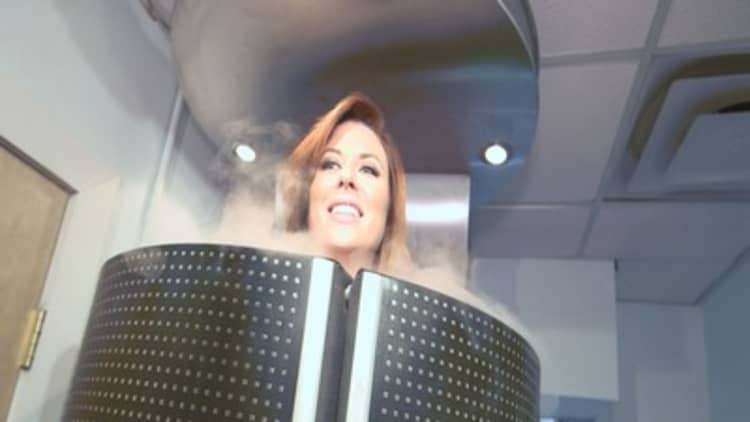
Facing a fourth back surgery after suffering with severe pain for more than a decade, Peter Merrigan decided to give an alternative treatment a try: cryotherapy.
Five sessions later, the CEO and co-founder of Boston-based private equity firm Taurus Investment Holdings said he's golfing and sailing again, and opting not to undergo surgery.
"I am doing all the things I was told a year ago I couldn't do," Merrigan said. "I believe in it because it's healing me."
Cryotherapy is a hot emerging trend among celebrities, athletes and even businessmen. Developed in Japan during the 1970s, cryotherapy is gaining steam here in the United States.
From LeBron James to Lindsay Lohan, more and more people are subjecting their bodies to subarctic temperatures of minus-200 degrees and below—all hoping to feel the benefits of this modern-day ice bath.
There's big business behind a few frozen minutes. Kryolife averages 75 clients per day, and keeping up with demand has become increasingly difficult—so much so that the small business is turning people away.
"We opened in New York City in 2013," said Eduardo Bohorquez, founder and chairman of Kryolife. "Since then we have quadrupled the number of clients we see daily."
Bohorquez said he plans to open four new locations across the country over the next six months.
From depression to weight loss to cellulite reduction—everyone has their own reasons for seeking the treatment.
Clients step into a circular chamber, fueled by nitric oxide, and immerse themselves in the freezing cold temperatures. At Kryolife, it costs $90 for three minutes of treatment. Nationwide, similar treatments can be found in the $50 to $60 range.
"It reduces inflammation," said Bohorquez. "It stimulates your immune system in a way that your response to it is lasting for least six to eight hours," he added.
Dr. Robert Dimeff, medical director of Sports Medicine at University of Texas Southwestern in Dallas, is skeptical.
"From a scientific standpoint, there is nothing published to say it has any effect," Dimeff said. "But people do feel differently coming out—there is a placebo effect if you believe in this. Ten years from now, it probably won't be around; it's a big fad right now."
Richard Otto, the founder of Impact Cryotherapy in Atlanta, is the only U.S. manufacturer of cryotherapy chambers, which can costs upwards of $50,000. The majority of the chambers come from places such as Ukraine and Poland.
Otto said he gets about 35 inquires per week from people looking to start their own cryotherapy business.
"We sell them as fast as we can build them," he said.
Otto said he envisions a day when cryotherapy chambers are located everywhere from gyms to spas to resorts and golf clubs.
"There is a new wave of interest across the country," Otto said.
Even several National Football League teams are using them in the hope that the treatments will lead to fast recovery time and relief from sore muscles.
"Athletes have been taking ice baths forever. It eases their muscles," said Otto. "The same thing happens with whole body cryotherapy. It has an anti-inflammatory effect."
Whether this trend is a fad or here to stay, both Bohorquez and Otto are invested for the long haul.
"When you have people coming for 15-25 sessions, that's not a fad," said Bohorquez.






